 Yvonne McBlain from Falkirk Education Services curriculum support team has been finding out about some excellent partnership work instigated by Sarah Ritchie, principal teacher at Bonnybridge Primary School. Bonnybridge Primary School has formed a partnership with Spire Junior School in Uganda. Spire Junior school is located in Bwaise –Kazo Nakamiro Zone in Kampala District the major city in Uganda. The partnership aims to increase understanding and awareness of each other’s culture, tradition and life style, encourage open mindness, critical thinking and reasoning in pupils and give pupils a true sense of global citizenship. Pupils in Primary 5 have been working closely with their peers in Uganda exchanging letters and photographs. Click here to view some of these letters written by primary 2 pupils. This joint project, Through My Window, compares the impact that the environment has on the daily lives of pupils in both countries. The partnership has been hugely successful for both schools and has had a positive impact on pupils. To ensure the growth of the partnership Mrs Stocks, head teacher at Bonnybridge PS, and Mrs Ritchie secured funding from the British Council visited Uganda in October. 3 planes and 14 hours later they found themselves in the city of Kampala where they were very warmly welcomed by Peter Basoga, Principal Teacher of Spire Junior School, and Godfrey Muyodi, class teacher. Over the course of the week Jill Stocks and Sarah Ritchie met with teachers and pupils, observed lessons and took part in the daily life of the school. The arrived colleagues and left friends – look at the leaver’s assembly planned for them here. Peter Basoga and Godfrey Muyodi from Spire Junior School will visit Bonnybridge Primary School in December 2013. Click here to view the welcome received by Sarah and Jill, and here to see Bonnybridge pupils talking about the project.
Yvonne McBlain from Falkirk Education Services curriculum support team has been finding out about some excellent partnership work instigated by Sarah Ritchie, principal teacher at Bonnybridge Primary School. Bonnybridge Primary School has formed a partnership with Spire Junior School in Uganda. Spire Junior school is located in Bwaise –Kazo Nakamiro Zone in Kampala District the major city in Uganda. The partnership aims to increase understanding and awareness of each other’s culture, tradition and life style, encourage open mindness, critical thinking and reasoning in pupils and give pupils a true sense of global citizenship. Pupils in Primary 5 have been working closely with their peers in Uganda exchanging letters and photographs. Click here to view some of these letters written by primary 2 pupils. This joint project, Through My Window, compares the impact that the environment has on the daily lives of pupils in both countries. The partnership has been hugely successful for both schools and has had a positive impact on pupils. To ensure the growth of the partnership Mrs Stocks, head teacher at Bonnybridge PS, and Mrs Ritchie secured funding from the British Council visited Uganda in October. 3 planes and 14 hours later they found themselves in the city of Kampala where they were very warmly welcomed by Peter Basoga, Principal Teacher of Spire Junior School, and Godfrey Muyodi, class teacher. Over the course of the week Jill Stocks and Sarah Ritchie met with teachers and pupils, observed lessons and took part in the daily life of the school. The arrived colleagues and left friends – look at the leaver’s assembly planned for them here. Peter Basoga and Godfrey Muyodi from Spire Junior School will visit Bonnybridge Primary School in December 2013. Click here to view the welcome received by Sarah and Jill, and here to see Bonnybridge pupils talking about the project.
Category: Continuing professional development
Latest Developments in the Teaching for Deep Learning
 Yvonne McBlain of Falkirk Education Services Curriculum Support team has been working with our team of facilitators for the Falkirk Teaching for Deep Learning programme. There are 18 trainee facilitators for the programme – 15 from the primary sector and 3 from the secondary sector. Some are already taking on a distributed leadership role in facilitating teacher learning communities within their own establishments. Others are willing to facilitate sessions across the authority, and anyone wishing to access their services should contact yvonne.mcblain@falkirk.gov.uk . The latest training meeting on 3rd October was the first opporunity for the facilitators to practise delivering the programme content to each other. Kim Davidson from Bo’ness Public PS, Jaime Thomson and Shirley Gallivan of Comely Park PS led the rest of the group through session 12 “Using professional collaboration to reflect upon & support teaching for deep learning”. The group was able to experience this session as participants, and then give feedback to Kim, Jaime and Shirley on their delivery. Read some of the feedback below:
Yvonne McBlain of Falkirk Education Services Curriculum Support team has been working with our team of facilitators for the Falkirk Teaching for Deep Learning programme. There are 18 trainee facilitators for the programme – 15 from the primary sector and 3 from the secondary sector. Some are already taking on a distributed leadership role in facilitating teacher learning communities within their own establishments. Others are willing to facilitate sessions across the authority, and anyone wishing to access their services should contact yvonne.mcblain@falkirk.gov.uk . The latest training meeting on 3rd October was the first opporunity for the facilitators to practise delivering the programme content to each other. Kim Davidson from Bo’ness Public PS, Jaime Thomson and Shirley Gallivan of Comely Park PS led the rest of the group through session 12 “Using professional collaboration to reflect upon & support teaching for deep learning”. The group was able to experience this session as participants, and then give feedback to Kim, Jaime and Shirley on their delivery. Read some of the feedback below:
Reflected and developed comments really well; Calm and purposeful
Pace really good – just right amount of time to reflect; Nice conversational feel
Allowed discussion to keep going – allowed it to go deeper; Circulated well
Deep understanding of content; Made participants feel comfortable
This meeting also gave Laura Wallace, Fiona Caygill and Mary Jalland an opportunity to share how sessions they had facilitated in their schools had gone. Staff colleagues gave these facilitators very positive feedback about the value of the sessions for them. Mary reported that her colleagues had put into practice some of their actions from the session the very next day! This training session was a very positive experience for all concerned, and we look forward to the remaining 3 meetings this year where the other facilitators get a chance to deliver their chosen session to our group. Click here to visit the Falkirk Teaching for Deep Learning Glow group and browse the session materials. * You may have to request permission to join the group – just click and ensure you type a short message explaining who you are and what establishment you work in.
Using a Smart Board to support active learning in the classroom
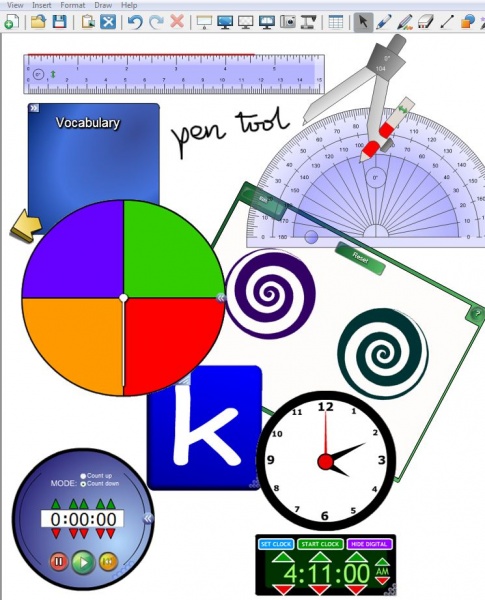 Malcolm Wilson, ICT Curriculum Development Officer in Falkirk Council Education Services Curriculum Support team, presented a hands-on continuing professional development session for staff from primary and secondary schools in Falkirk on the use of Smart Notebook software with the Smart Board interactive whiteboard to support active learning across the curriculum.
Malcolm Wilson, ICT Curriculum Development Officer in Falkirk Council Education Services Curriculum Support team, presented a hands-on continuing professional development session for staff from primary and secondary schools in Falkirk on the use of Smart Notebook software with the Smart Board interactive whiteboard to support active learning across the curriculum.
Participants were guided through hands-on use of a host of interactive techniques using Smart Notebook software with the Smart Board which a teacher could use to support learning and teaching in the classroom across the curriculum. These included different ways of using tools like the magic pen tool (to zoom in, magnify, spotlight, and fade out annotations), using pen tools for annotations and sorting on screen as well as handwriting recognition, moving pictures to hide and reveal, matching images within tables, and page activity recording.
The variety of different gallery items including engaging interactive tools such as timers were illustrated in various activity contexts, as well as how to adapt the host of lesson activity toolkit pre-created game-type interactives to any topic. Hands-on use of the resources on the Smartboard by participants illustrated how the activities can be used to help engage pupils in their learning.
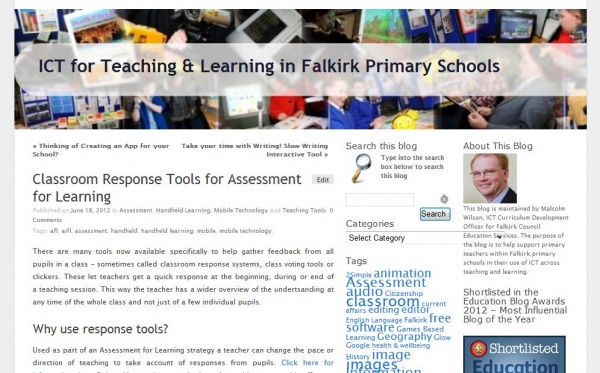 There are also many free pre-created templates and question sets ready to be downloaded and adapted by teachers from Smart Exchange to suit the needs of their own pupils. Click here for the online Smart Exchange site where these can be downloaded.
There are also many free pre-created templates and question sets ready to be downloaded and adapted by teachers from Smart Exchange to suit the needs of their own pupils. Click here for the online Smart Exchange site where these can be downloaded.
The resources used during the session can be accessed by clicking here (note that a Glow username and password is required to access these resources).
Comments from participants included:
“Well delivered and well organised course with a clear focus, interesting and relevant content and an engaging presenter.”
“Taught me new ways to use my SMART board which will in turn enhance learning of my pupils.”
“Showed me how to use different functions on a SMART board that I had never seen or used before, with examples of how they could be used, which was helpful so I can start using these with my own class.”
“Provided practical opportunities to engage with the materials presented, and the delivery of the course was engaging and accessible to someone looking to develop their use of a SMART board in their classroom.”
“A very well presented course that catered for a cross section of abilities.”
“The hands on overview was very helpful and the delivery style of the presenter was at a pace that was very easy to follow.”
Larbert Cluster Interdisciplinary Planning
 Yvonne McBlain of Falkirk Curriculum Support Team was thrilled to attend the first of a series of cross-sector cluster interdisciplinary planning sessions on Tuesday 17th September 2013. As chair of the Commonwealth Games Interdisciplinary Project sub-group, Linda-Anne Reid worked with colleagues to co-ordinate this collegiate planning. Early year’s practitioners and primary 1 teachers met in Stenhousemuir PS, first level teachers met in Carron PS, and second and third in Kinnaird PS. All staff were given relevant planning materials and information in advance, including the cluster plan, NAR planning flow chart, NAR planning flow chart instructions and Falkirk Community Trust/Active Schools Going for Glasgow Accreditation paper. Isobel Edmond provided early level practitioners with a very clear introductory overview of the potential benefits of this interdisciplinary learning context. Morag Carson then explained that each of the 3 hour-long planning sessions would involve same stage groups planning within 3 bundles of E & Os. This means that the Larbert cluster will generate at least 3 interdisciplinary plans per level which meet experiences and outcomes from: Social subjects & Expressive Arts, Social subjects & Technology, & Social subjects and Science. They are more than happy for these plans to be made available across the authority when complete. Once these groups were established, their first task was to identify the small bundle of E & Os they felt could be progressed by this context, for their learners. Yvonne and Linda-Anne enjoyed a whistle-stop tour of the nursery and primary 1 groups, and then nipped up to Kinnaird PS to pop into the second and third level groups. The staff involved had already made choices about their E & Os , and begun to consider learning intentions, and the best activities to develop knowledge, understanding and skills within the Commonwealth Games context. There will be 2 further planning sessions on 30th October and 21st November, but some groups have opted to do one double session instead. Although clearly linking into national events taking place in 2014, this way of working across-cluster offers potential benefits on many levels: the planning of robust interdisciplinary learning, development of understanding of skills progression, and the sharing of practice generally. All in all, a really active, purposeful form of collegiate professional learning!
Yvonne McBlain of Falkirk Curriculum Support Team was thrilled to attend the first of a series of cross-sector cluster interdisciplinary planning sessions on Tuesday 17th September 2013. As chair of the Commonwealth Games Interdisciplinary Project sub-group, Linda-Anne Reid worked with colleagues to co-ordinate this collegiate planning. Early year’s practitioners and primary 1 teachers met in Stenhousemuir PS, first level teachers met in Carron PS, and second and third in Kinnaird PS. All staff were given relevant planning materials and information in advance, including the cluster plan, NAR planning flow chart, NAR planning flow chart instructions and Falkirk Community Trust/Active Schools Going for Glasgow Accreditation paper. Isobel Edmond provided early level practitioners with a very clear introductory overview of the potential benefits of this interdisciplinary learning context. Morag Carson then explained that each of the 3 hour-long planning sessions would involve same stage groups planning within 3 bundles of E & Os. This means that the Larbert cluster will generate at least 3 interdisciplinary plans per level which meet experiences and outcomes from: Social subjects & Expressive Arts, Social subjects & Technology, & Social subjects and Science. They are more than happy for these plans to be made available across the authority when complete. Once these groups were established, their first task was to identify the small bundle of E & Os they felt could be progressed by this context, for their learners. Yvonne and Linda-Anne enjoyed a whistle-stop tour of the nursery and primary 1 groups, and then nipped up to Kinnaird PS to pop into the second and third level groups. The staff involved had already made choices about their E & Os , and begun to consider learning intentions, and the best activities to develop knowledge, understanding and skills within the Commonwealth Games context. There will be 2 further planning sessions on 30th October and 21st November, but some groups have opted to do one double session instead. Although clearly linking into national events taking place in 2014, this way of working across-cluster offers potential benefits on many levels: the planning of robust interdisciplinary learning, development of understanding of skills progression, and the sharing of practice generally. All in all, a really active, purposeful form of collegiate professional learning!
Primary ICT Co-ordinator Support Session – mobile device focus
 Malcolm Wilson, ICT Curriculum Development Officer in the Curriculum Support team of Falkirk Council Education Services, provided support sessions for Primary ICT Co-ordinators, with a focus on mobile devices for schools at the beginning stages of looking at how to use them in learning and teaching. How mobile devices can be used to make a difference to learning and teaching, the practical implications of this in a school, and how to overcome barriers to successful integration, are issues around which schools embarking on the journey exploring using mobile devices consider.
Malcolm Wilson, ICT Curriculum Development Officer in the Curriculum Support team of Falkirk Council Education Services, provided support sessions for Primary ICT Co-ordinators, with a focus on mobile devices for schools at the beginning stages of looking at how to use them in learning and teaching. How mobile devices can be used to make a difference to learning and teaching, the practical implications of this in a school, and how to overcome barriers to successful integration, are issues around which schools embarking on the journey exploring using mobile devices consider.
This post describes just a few resources which may be useful to help schools at the beginning of the journey towards considering using mobile devices to support learning and teaching.
AUP
When schools have wireless, which can be accessed by pupils on their own device, and pupils are signed up to an Acceptable Use Policy which sets out responsibilities, they can then consider how best to to incorporate personally-owned mobile devices in learning and teaching.
 Falkirk Council Education Services provides educational establishments with an Acceptable Use Policy which takes account of mobile devices and social media. This is available here: https://blogs.glowscotland.org.uk/fa/mobiledevices/documents/
Falkirk Council Education Services provides educational establishments with an Acceptable Use Policy which takes account of mobile devices and social media. This is available here: https://blogs.glowscotland.org.uk/fa/mobiledevices/documents/
Device Neutral Assignments
 Device Neutral Assigments are tasks which let pupils choose tool according to device available. With multiple types of devices in a classroom (where pupils bring their own device), rather than the tool as the focus for learning, instead the tool should be chosen to suit the intended learning – and may be chosen by teacher or pupil to best suit task to support learning or demonstrate understanding of the learning – the learning activity does not presume a specific tool will be used. The link below provides further description of device-neutral assignments and provides links to tools for any learning activity (such as creating a video, note-taking, creating a video, creating audio, creating an assessment, etc) with suggested example apps/software/online tool specific to each device https://blogs.glowscotland.org.uk/fa/mobiledevices/device-neutral-assignment/
Device Neutral Assigments are tasks which let pupils choose tool according to device available. With multiple types of devices in a classroom (where pupils bring their own device), rather than the tool as the focus for learning, instead the tool should be chosen to suit the intended learning – and may be chosen by teacher or pupil to best suit task to support learning or demonstrate understanding of the learning – the learning activity does not presume a specific tool will be used. The link below provides further description of device-neutral assignments and provides links to tools for any learning activity (such as creating a video, note-taking, creating a video, creating audio, creating an assessment, etc) with suggested example apps/software/online tool specific to each device https://blogs.glowscotland.org.uk/fa/mobiledevices/device-neutral-assignment/
QR Codes
 Quick Response codes are square barcodes which, with a mobile device app, turn the mobile device camera into a barcode reader, to then provide a very quick way to access weblinks, video, images or text. http://goo.gl/1nnb2
Quick Response codes are square barcodes which, with a mobile device app, turn the mobile device camera into a barcode reader, to then provide a very quick way to access weblinks, video, images or text. http://goo.gl/1nnb2
Socrative
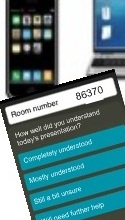 Socrative is a free classroom response system works on any Internet-connected device. This lets teachers set up questions for responses by pupils on any device. Pupils go to http://m.socrative.com & enter the teacher’s classroom number. http://goo.gl/w7t16. Socrative has a host of resources freely shared by other teachers worldwide.
Socrative is a free classroom response system works on any Internet-connected device. This lets teachers set up questions for responses by pupils on any device. Pupils go to http://m.socrative.com & enter the teacher’s classroom number. http://goo.gl/w7t16. Socrative has a host of resources freely shared by other teachers worldwide.
Padlet
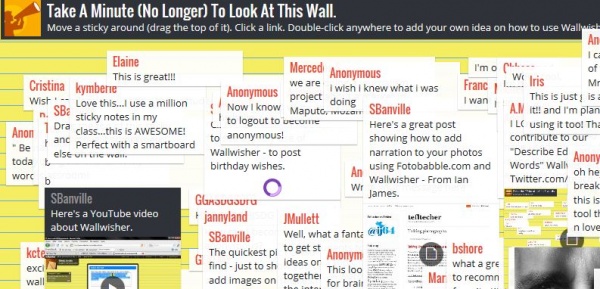 Padlet provides a classroom-friendly feedback discussion area online , private to the classroom, which can provide a useful tool in formative assessment in providing an online feedback tool which works on any Internet-connected device.
Padlet provides a classroom-friendly feedback discussion area online , private to the classroom, which can provide a useful tool in formative assessment in providing an online feedback tool which works on any Internet-connected device.
Managing Devices in the Classroom
 The Traffic Light Approach is one way teachers have found useful to support classroom management of mobile devices. Using this approach the teacher determines the level of use, or not, of mobile devices, at any given time in classroom
The Traffic Light Approach is one way teachers have found useful to support classroom management of mobile devices. Using this approach the teacher determines the level of use, or not, of mobile devices, at any given time in classroom
Resources to support moving from One to Many to 1:1
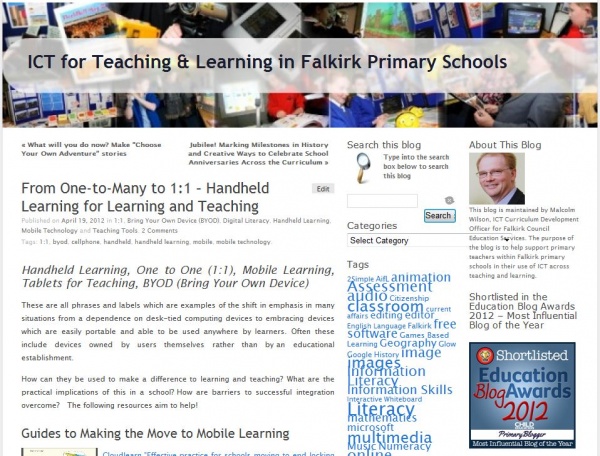 From One to Many to 1:1 provides extensive links to resources which support the shift in emphasis in many situations from a dependence on desk-tied computing devices to embracing devices which are easily portable and able to be used anywhere by learners. Often these include devices owned by users themselves rather than by an educational establishment. The phrases often used to describe this form of application include: Handheld Learning, One to One (1:1), Mobile Learning, Tablets for Teaching, and BYOD (Bring Your Own Device).
From One to Many to 1:1 provides extensive links to resources which support the shift in emphasis in many situations from a dependence on desk-tied computing devices to embracing devices which are easily portable and able to be used anywhere by learners. Often these include devices owned by users themselves rather than by an educational establishment. The phrases often used to describe this form of application include: Handheld Learning, One to One (1:1), Mobile Learning, Tablets for Teaching, and BYOD (Bring Your Own Device).
Update on our Teaching for Deep Learning Programme
 Yvonne McBlain from Falkirk’s Curriculum Support team has now created a page for each of our Teaching for Deep Learning sessions here in Glow. Five of our secondary schools have used, or are beginning to use these sessions as content for their Teacher Learning Communities and working groups. Nineteen of our primary schools have already accessed at least one of the sessions – sometimes as a whole staff, and other times within smaller collegiate groups. We have 18 TfDL (Teaching for Deep Learning) facilitators who are being trained to deliver the sessions – some want to do this in their own schools only, whereas others are happy to make themselves available across the authority where needed. Four of our secondary schools are modelling a whole range of Donaldson Review recommendations regarding professional learning in their use of the programme. Most have recruited teachers interested in becoming facilitators within their schools, who then attend an information session (Click to view) on the programme from Yvonne. Each school is then deciding how they can enable staff to identify which sessions should be priorities for their professional learning this session. Once these decisions are made, teacher learning communities interested in the same sessions can be formed. The same model of distributed leadership (facilitators) and professional autonomy through self-evaluation is being taken forward by some of our primary schools “in house” too. Feedback from participants of sessions so far confirms the value of the programme as one of the ways in which we can move Falkirk schools from Good to Great.
Yvonne McBlain from Falkirk’s Curriculum Support team has now created a page for each of our Teaching for Deep Learning sessions here in Glow. Five of our secondary schools have used, or are beginning to use these sessions as content for their Teacher Learning Communities and working groups. Nineteen of our primary schools have already accessed at least one of the sessions – sometimes as a whole staff, and other times within smaller collegiate groups. We have 18 TfDL (Teaching for Deep Learning) facilitators who are being trained to deliver the sessions – some want to do this in their own schools only, whereas others are happy to make themselves available across the authority where needed. Four of our secondary schools are modelling a whole range of Donaldson Review recommendations regarding professional learning in their use of the programme. Most have recruited teachers interested in becoming facilitators within their schools, who then attend an information session (Click to view) on the programme from Yvonne. Each school is then deciding how they can enable staff to identify which sessions should be priorities for their professional learning this session. Once these decisions are made, teacher learning communities interested in the same sessions can be formed. The same model of distributed leadership (facilitators) and professional autonomy through self-evaluation is being taken forward by some of our primary schools “in house” too. Feedback from participants of sessions so far confirms the value of the programme as one of the ways in which we can move Falkirk schools from Good to Great.
Satisfying the yearning for mobile learning!
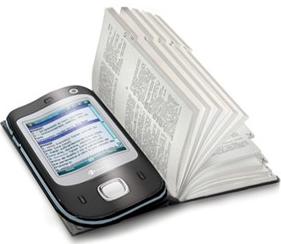 Stuart Lennie and Malcolm Wilson of the Falkirk Council Education Services Curriculum Support team have been working to create a Mobile Devices in Falkirk Education Blog.
Stuart Lennie and Malcolm Wilson of the Falkirk Council Education Services Curriculum Support team have been working to create a Mobile Devices in Falkirk Education Blog.
The blog is designed to support Falkirk Council education establishments in their use of mobile devices in learning and teaching.
Beginning from September 2013, this site will develop to have further materials as work develops in establishments.
Click here to visit the blog: https://blogs.glowscotland.org.uk/fa/mobiledevices/
[kml_flashembed movie="http://www.youtube.com/v/LkiRWTJYPS0" width="425" height="344" allowfullscreen="true" fvars="fs=1" /]
Gateway to CPD now open!
Stuart Lennie, along with Lynne Lauder and Anne Hutchison of the Falkirk Council Education Services Curriculum Support team have been working to commission and implement a new way for staff to search, request, and record CPD opportunities.
The new CPD Manager Portal is now live for all Falkirk Council Education Services staff, and can be accessed here:
All Falkirk Education Services staff should have received their logins via email by now. If you have not received your email, please contact cpd.educ@falkirk.gov.uk from your Falkirk Council emial address.
Active Literacy for P6/7/S1 – New Online Support Materials
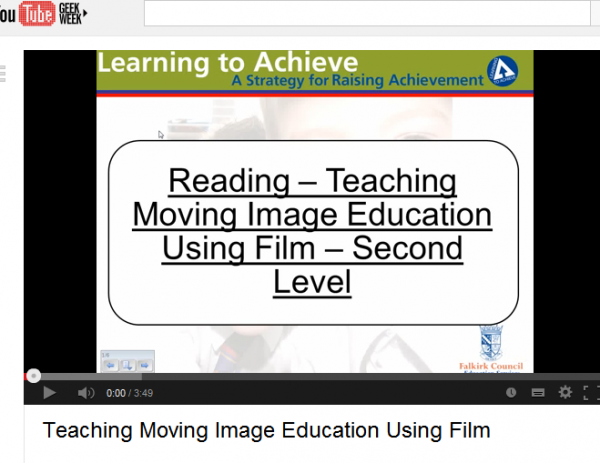 Sharon Wallace, Curriculum Support Officer, Curriculum Support Team, has been working on a number of new CPD training support videos for Active Literacy.
Sharon Wallace, Curriculum Support Officer, Curriculum Support Team, has been working on a number of new CPD training support videos for Active Literacy.
These short video sessions are aimed at Second level, however some of the materials can be adapted and applied to earlier stages.
Sharon has recorded nine short videos for ‘Reading’ including using film trailers, critical analysis, non-fiction analysis and moving image education. There are two sessions relating to spelling and these include the new spelling section and vocabulary building which explores homophones and affixes. There is one training session called ‘Developing Writing at Second Level’ and this looks at incorporating a range of different genres, as well as the use of mixed ability writing trios and effective conferencing to improve writing skills.
These short animation videos are part of a series of CPD online sessions which range from P1 to S1.[kml_flashembed movie="http://www.youtube.com/v/gvXEPThdi2c" width="425" height="344" allowfullscreen="true" fvars="fs=1" /]


